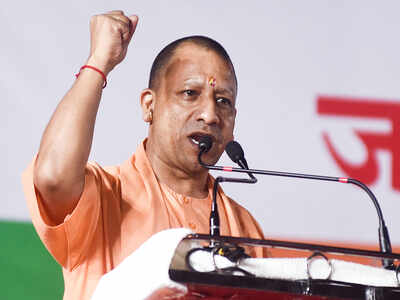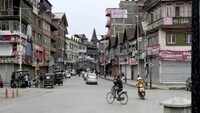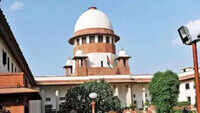
NEW DELHI: Uttar Pradesh government rolled out a blueprint of 'Uttar Pradesh Special Security Force' (UPSSF) this week which the administration said aims to protect key establishments and provide security cover to the VIPs similar to how Central Industrial Security Force (CISF) operates.
Here is all you need to know about UPSSF:
* The announcement to form the UPSSF came at the heels of Allahabad high court direction to the state government to constitute a specialised force to protect civil courts, upcoming airports, Metro rails besides providing security to VIPs and VVIPs.
* According to the UPSSF Act explains that the security of vital installations including courts administrative offices, shrines, Metro rail, airports, banks, other financial institutions, industrial undertakings and VIPs is generally taken care of by the police and Provincial Armed Constabulary Force which it said, "are not specially trained and skilled for this task.”
* UPSSF will be given special powers and its members would be able to make arrests or search without a warrant issued by a magistrate.
* The government may frame rules through an ordinance to run this force. A detailed plan in this regard will be prepared by the Director General of Police (DGP).
* The security force may be provided to the banks, too, if required. The force will remain under the jurisdiction of UP DGP and led by an additional director general- rank officer.
* As per the plan, the government will recruit 9,919 security personnel in five battalions of the special force.
* An estimated Rs 1,747 crore is expected to be spent per year on these battalions.
* In the first phase, the government will take the help of PAC (Provincial Armed Constabulary) for putting in place the requisite infrastructure and manpower. Initially, PAC jawans will be inducted while the special force will be constituted over the next one year.
What is the controversy?
Formation of the UPSSFhas been criticized on three grounds: The powers given to the force, the ambit of what the force will protect and the protection given to the members of force in case they violate their power.
* Arrest without a warrant
Subsection (1) of Section 10 (“Power to arrest without warrant”) of UPSSFAct says, “Any member of the force may, without any order from a Magistrate and without a warrant, arrest any person, who voluntarily causes hurt…”, or a person against whom there is a “reasonable suspicion”, or any person, who attempts to “commit a cognizable offence”.
UPSSF personnel will have the right to remove trespassers on the premises under its protection.
There are other Acts which have similar power to "arrest without a warrant" like Section 11 of the CISF Act, Section 16 of the Maharashtra State Security Corporation Act, 2010 and Section 11 of the Odisha Industrial Security Force Act, 2012.
In addition to the power to "arrest without warrant", these Acts also give the respective force the "power to search without a warrant."
* Ambit of protection
However, the difference lies in what these forces protect and the protection granted to the personnel of the force.
The CISF and Odisha Industrial Security Force protect “Industrial Undertakings” while the Maharashtra State Security Corporation provides protection to state and central government offices, undertakings, establishments, institutions, employees of all such establishments, financial, cultural, medical, religious institutions, malls, clubs, hotels and vital Installations like the Bhabha Atomic Research Centre, atomic power stations, power grids, etc.
On the other hand, UPSSF protects all such bodies that the existing three Acts secure but still has a wider ambit as UPSSF will also provide protection to individuals, residential premises, statues, monuments and both public & private buildings.
* Protection given to UPSSF members
The Act has been deemed controversial also because it gives sweeping protection to its members. Sections 15 and 16 of the UPSSF Act, 2020, offer “protection of action taken in good faith” and “cognizance of offence”.
Section 16 of the UPSSF Act says: “No court shall take cognizance of an offence against any member of the force” for action taken in the discharge of his duties.
On the contrary, action can be taken against any CISF personnel on the grounds that he/she violated the power of the force. If a complaint is made against a CISF member, legal proceedings must commence within three months of the commission of the act or the filing of the complaint.
Here is all you need to know about UPSSF:
* The announcement to form the UPSSF came at the heels of Allahabad high court direction to the state government to constitute a specialised force to protect civil courts, upcoming airports, Metro rails besides providing security to VIPs and VVIPs.
* According to the UPSSF Act explains that the security of vital installations including courts administrative offices, shrines, Metro rail, airports, banks, other financial institutions, industrial undertakings and VIPs is generally taken care of by the police and Provincial Armed Constabulary Force which it said, "are not specially trained and skilled for this task.”
* UPSSF will be given special powers and its members would be able to make arrests or search without a warrant issued by a magistrate.
* The government may frame rules through an ordinance to run this force. A detailed plan in this regard will be prepared by the Director General of Police (DGP).
* The security force may be provided to the banks, too, if required. The force will remain under the jurisdiction of UP DGP and led by an additional director general- rank officer.
* As per the plan, the government will recruit 9,919 security personnel in five battalions of the special force.
* An estimated Rs 1,747 crore is expected to be spent per year on these battalions.
* In the first phase, the government will take the help of PAC (Provincial Armed Constabulary) for putting in place the requisite infrastructure and manpower. Initially, PAC jawans will be inducted while the special force will be constituted over the next one year.
What is the controversy?
Formation of the UPSSFhas been criticized on three grounds: The powers given to the force, the ambit of what the force will protect and the protection given to the members of force in case they violate their power.
* Arrest without a warrant
Subsection (1) of Section 10 (“Power to arrest without warrant”) of UPSSFAct says, “Any member of the force may, without any order from a Magistrate and without a warrant, arrest any person, who voluntarily causes hurt…”, or a person against whom there is a “reasonable suspicion”, or any person, who attempts to “commit a cognizable offence”.
UPSSF personnel will have the right to remove trespassers on the premises under its protection.
There are other Acts which have similar power to "arrest without a warrant" like Section 11 of the CISF Act, Section 16 of the Maharashtra State Security Corporation Act, 2010 and Section 11 of the Odisha Industrial Security Force Act, 2012.
In addition to the power to "arrest without warrant", these Acts also give the respective force the "power to search without a warrant."
* Ambit of protection
However, the difference lies in what these forces protect and the protection granted to the personnel of the force.
The CISF and Odisha Industrial Security Force protect “Industrial Undertakings” while the Maharashtra State Security Corporation provides protection to state and central government offices, undertakings, establishments, institutions, employees of all such establishments, financial, cultural, medical, religious institutions, malls, clubs, hotels and vital Installations like the Bhabha Atomic Research Centre, atomic power stations, power grids, etc.
On the other hand, UPSSF protects all such bodies that the existing three Acts secure but still has a wider ambit as UPSSF will also provide protection to individuals, residential premises, statues, monuments and both public & private buildings.
* Protection given to UPSSF members
The Act has been deemed controversial also because it gives sweeping protection to its members. Sections 15 and 16 of the UPSSF Act, 2020, offer “protection of action taken in good faith” and “cognizance of offence”.
Section 16 of the UPSSF Act says: “No court shall take cognizance of an offence against any member of the force” for action taken in the discharge of his duties.
On the contrary, action can be taken against any CISF personnel on the grounds that he/she violated the power of the force. If a complaint is made against a CISF member, legal proceedings must commence within three months of the commission of the act or the filing of the complaint.
Download
The Times of India News App for Latest India News

Coronavirus outbreak
Trending Topics
LATEST VIDEOS
India
 Covid-19: India's coronavirus case tally crosses 50-lakh mark
Covid-19: India's coronavirus case tally crosses 50-lakh mark  Revived grass root democracy in J&K despite attempts to derail the process: India
Revived grass root democracy in J&K despite attempts to derail the process: India  Google Doodle asks people to remember to wear masks during the coronavirus pandemic
Google Doodle asks people to remember to wear masks during the coronavirus pandemic  SC halts TV show 'vilifying' minorities
SC halts TV show 'vilifying' minorities  Facebook India MD breaks silence, says FB does not profit from hate speech
Facebook India MD breaks silence, says FB does not profit from hate speech  450 Indians stranded in Saudi Arabian jail waiting for repatriation: MBT spokesperson Amjad Ullah Khan
450 Indians stranded in Saudi Arabian jail waiting for repatriation: MBT spokesperson Amjad Ullah Khan
More from TOI
Navbharat Times
Featured Today in Travel
Quick Links
Coronavirus in MumbaiCoronavirus in KolkataCoronavirus in HyderabadCoronavirus in DelhiCoronavirus in BangaloreCoronavirus symptomsCoronavirus in IndiaWhat is CoronavirusCoronavirus NewsSolar EclipseNPRWhat is NRCCAB BillCAB and NRCRTI BillPodcast newsLok SabhaShiv SenaYSRCPCongressBJP newsUIDAIIndian ArmyISRO newsSupreme Court
Get the app



